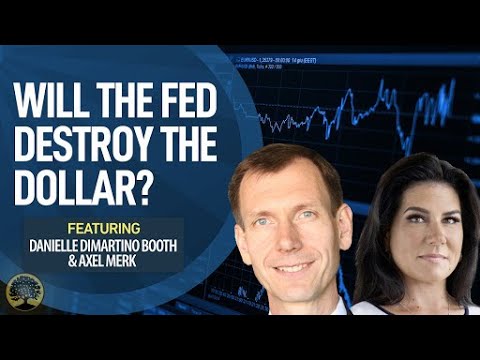The Federal Reserve’s official target rate of inflation is 2% per year.
Put another way, that means that if the Fed hits its target, the value of today’s dollar will only be worth around a third of its current value in 50 years.
Think that can’t happen? It already has.
Look at the chart below showing the decline in the purchasing power of the US dollar since the creation of the Fed in 1913:
<img class=“aligncenter size-medium” src=“https://peakprosperity.com/wp-content/uploads/2021/09/Rise-and-Fall-of-the-USD-64c2.jpg” alt="“Decline in purchasing power of US dollar” width=“1601” height=“866” />
With the Fed now in “extreme easing” mode, having printed up nearly $3 trillion in thin-air money just this year alone, it’s not a stretch to expect the value of the dollar to decline even more precipitously from here than current estimates predict.
So, in a world where the Fed is considered by many to BE the market, backstopping investors and stepping in at a moments notice to prevent losses, what is the Fed most likely to do from here?
To address this, we recorded this excellent “fly on the wall” discussion between Danielle DiMartino Booth and Axel Merk, both of whom have inside access to the people running the Federal Reserve. In this video, they reveal that they share the same sad conclusion that the Fed really doesn’t have a plan to get out of the mess it’s in (a mess of its own creation) and is pretty much just playing for time, trying to delay the inevitable, painful repercussions of its failed policy.
Which is why now, more than ever, is the time to partner with a financial advisor who understands the nature of the risks in play, can craft an appropriate portfolio strategy for you given your needs, and apply sound risk management protection where appropriate:
Anyone interested in scheduling a free consultation and portfolio review with Mike Preston and John Llodra and their team at New Harbor Financial can do so by clicking here.
And if you’re one of the many readers brand new to Peak Prosperity over the past few months, we strongly urge you get your financial situation in order in parallel with your ongoing physical coronavirus preparations.
We recommend you do so in partnership with a professional financial advisor who understands the macro risks to the market that we discuss on this website. If you’ve already got one, great.
But if not, consider talking to the team at New Harbor. We’ve set up this ‘free consultation’ relationship with them to help folks exactly like you.
This is a companion discussion topic for the original entry at https://peakprosperity.com/will-the-fed-destroy-the-dollar/


